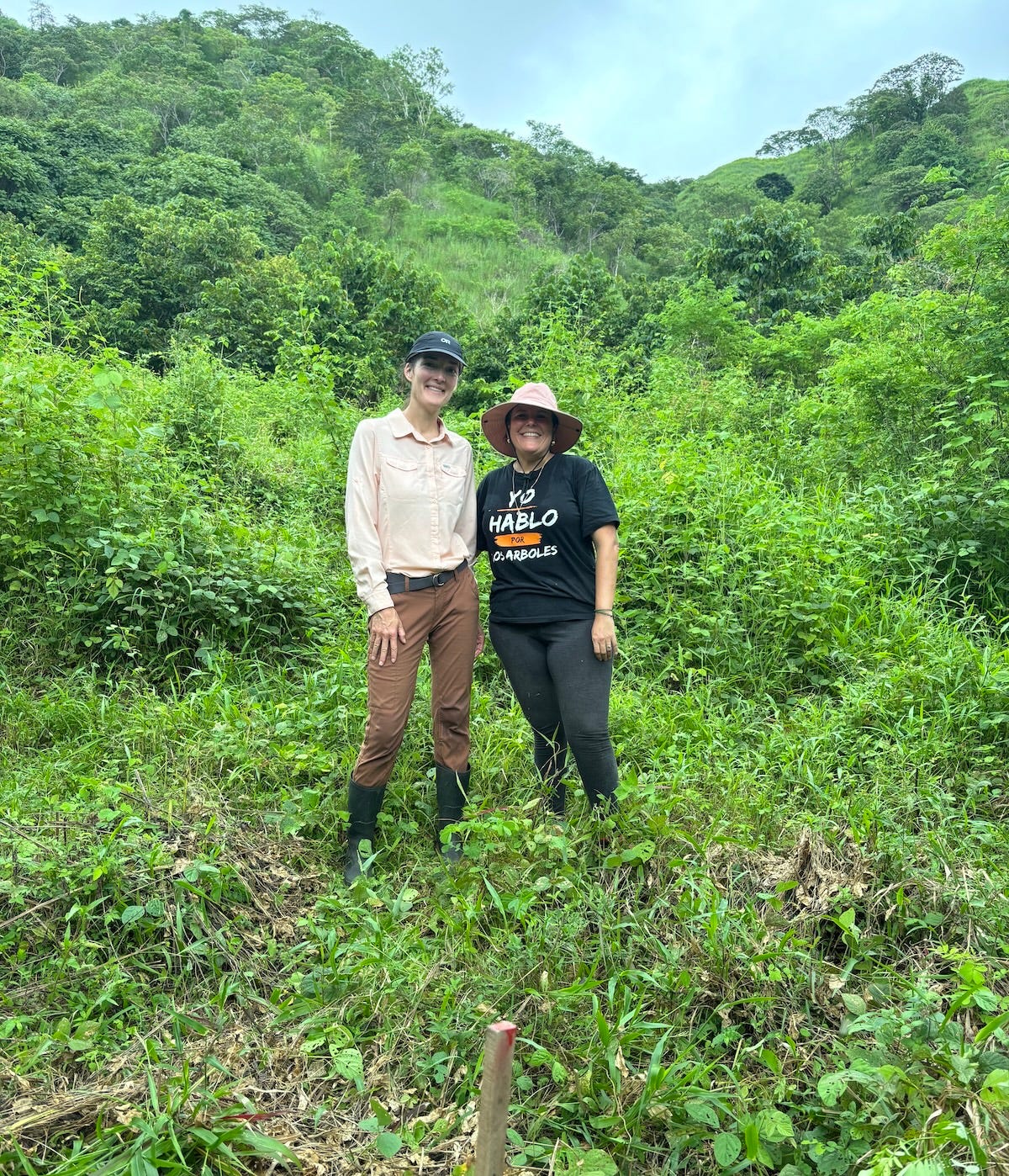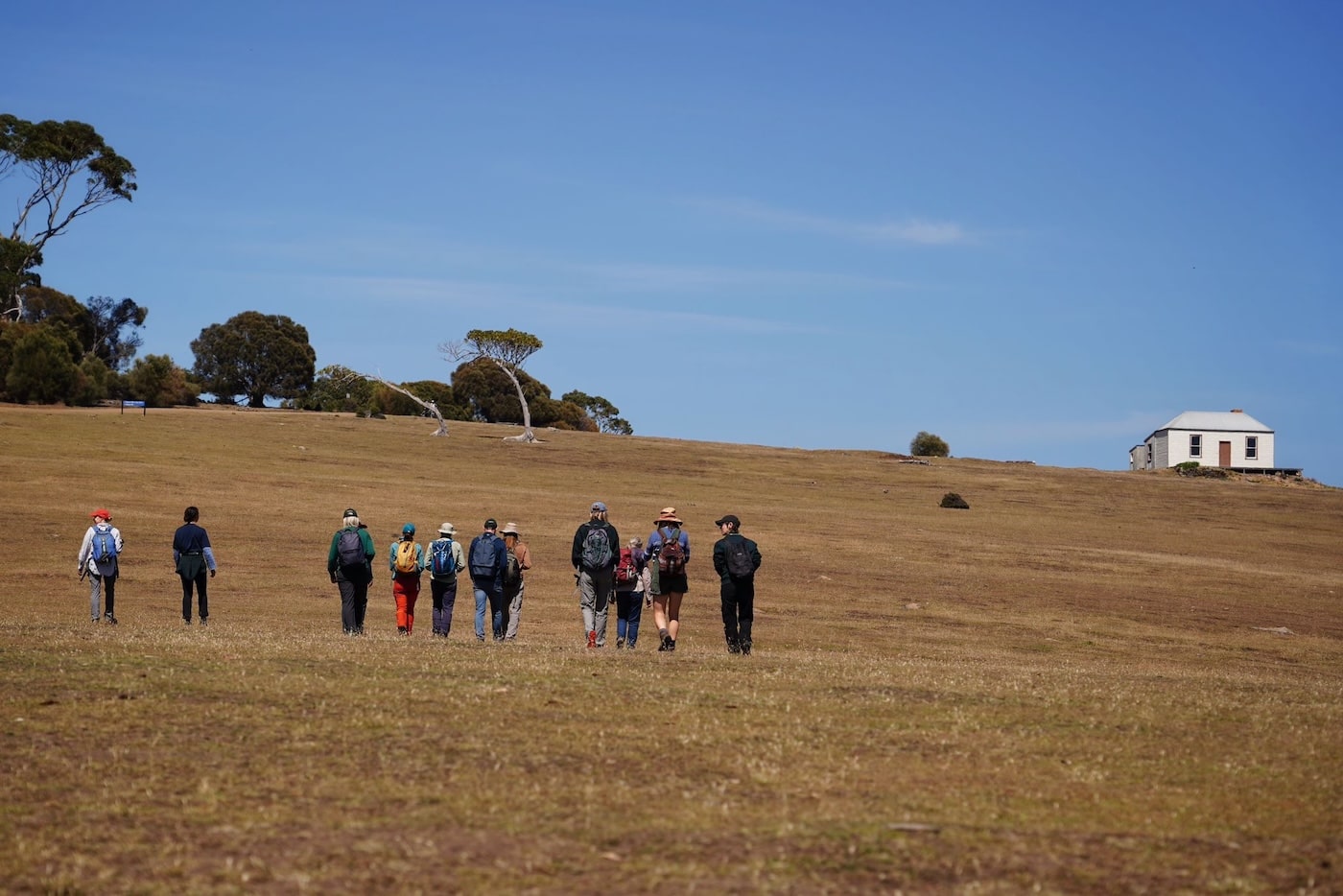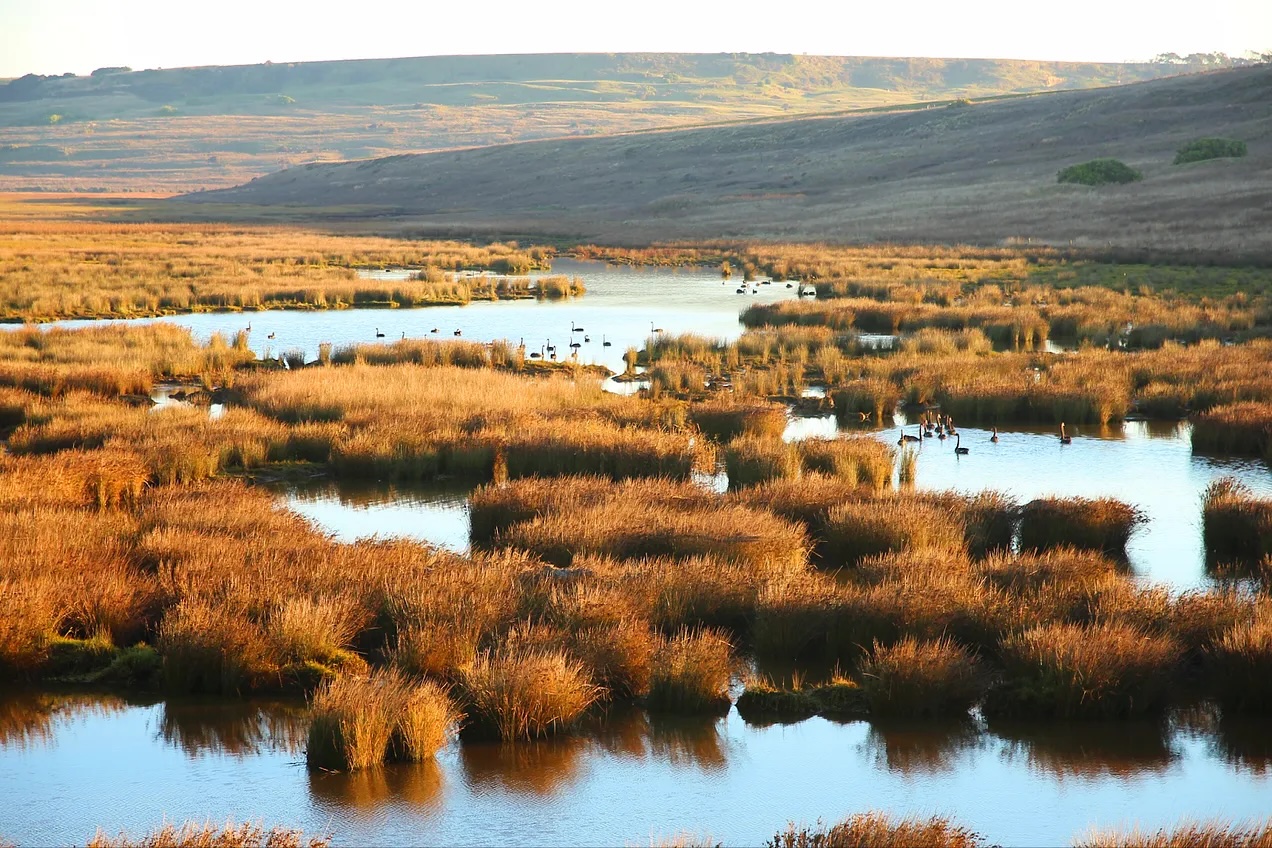With the year’s end approaching, we’ve taken a moment to reflect, compiling our last three months of accomplishments and learnings into this newsletter.
This reflection process has been essential to our planning for 2025 — however, we’ve remained aware that for nature, a year is but a moment. Trees measure their lives in decades, coral reefs in centuries, and the Earth itself in eons. What truly endures isn’t the turn of a calendar page, but the ripple effects of our actions.
As 2025 draws closer, 2030 and 2100 are drawing closer too.
Humans are one species among millions, yet our influence on the future of all life is immense. This influence comes with a responsibility to think beyond ourselves, to consider every species we share this planet with and the intricate systems that connect us all. And therein lies the key to tackling the biodiversity crisis. We must think in stages and systems. We must reimagine the world we want now and the world we’ll never see. And we must take the time to celebrate small wins without losing sight of the long journey ahead.
Every day, all of us co-write the future. So, with the scene set, here’s what we’ve been up to since September.
New investments
Our portfolio has grown to 30 partners across 16 countries. In the past three months, we’ve made a number of investments, including two new loans and one new equity investment, furthering our mission to conserve and restore biodiversity through sustainable investment.
Doselva
Doselva is an aggregator, processor and exporter of spices bridging the gap between smallholder farmers and international markets. Doselva works with 500 organic farmers in Nicaragua and Honduras, who primarily produce turmeric, ginger, cardamom, allspice, vanilla and lemongrass. These farmers grow crops in multi-story agroforestry systems in or adjacent to tropical forests and biosphere reserves. Doselva aims to reduce the land-use practices that threaten these critical ecosystems by improving farmer incomes, implementing regenerative practices and investing in local climate-change resilience.
Courageous Land
Courageous Land is on a mission to make our food systems carbon-negative and nature-positive. Courageous Land’s agroforestry intelligence platform helps landowners with agroforestry planning, financing and management, as well as the sale of agroforestry products, timber and carbon credits. Operating primarily in Brazil, Courageous Land leverages its technology alongside on-the-ground landscape hubs to drive large-scale reforestation and conservation efforts. Together, these initiatives contribute to restoring ecosystems while promoting sustainable development.
UNOCACE
UNOCACE is a co-operative of 25 cacao organisations that works with over 1,300 producers across 11 Provinces of Ecuador. These areas are rich in biodiversity but face threats from monocultures and deforestation, making conservation both important and urgent. By promoting cocoa production in dynamic agroforestry systems, and purchasing cacao and plantain from producers, UNOCACE supports producers to conserve native species, regenerate habitat and diversify income opportunities.

Site visits
In September and October, our Research Lead Summer visited Central Cacao in Guatemala, Pro Eco Azuero in Panama and Team Tap in Colombia. These visits allow us to connect with our partners and their teams, better understand the landscapes in which they operate, and to deepen our understanding of the challenges and opportunities that exist for both biodiversity and livelihoods.
Central Cacao
Central Cacao supports cacao agroforestry on previously degraded grazing land near the Laguna Lachuá National Park in Guatemala, while preserving areas of tropical rainforest that remain standing.
Highlights from our visit
- We visited Central Cacao’s farms, where a mix of cacao and shade species have been planted on land previously degraded by monocropping and cattle grazing. A portion of the farms — on average 30% — is preserved as tropical forest, providing critical wildlife habitat near the Laguna Lachuá National Park. It was great to witness some fauna — including spiders, frogs, and various birds — thriving in this environment.
- We visited the Laguna Lachuá Foundation’s (FUNDALACHUÁ) processing facilities in Saholom, Alta Verapaz. Central Cacao works with FUNDALACHUÁ to provide technical on-farm assistance, support producers in registering for forest conservation subsidies, and source and purchase high-quality cacao.
- Climate change is shifting precipitation and temperature patterns in the region, greatly impacting the production of cacao and other crops such as cardamom. Recognising that sustainable livelihoods in this region depend on the ability to adapt to a changing climate, Central Cacao is actively evaluating methods to support climate adaptation both on their own farms and among the producers they work with. As part of our visit, we co-hosted a workshop in Cobán with 14 cacao producers on the impact of climate change and opportunities for adaptation.

Team Tap
Team TAP is a producer, trader and exporter of Colombian coffee and cacao, that operates with the knowledge that success for biodiversity and local livelihoods depends on community members having diverse economic opportunities.
Highlights from our visit
- We visited areas in the Sierra Nevada de Santa Marta that, having been previously cleared, are now being replanted with coffee and macadamia which is supporting livelihoods and soil restoration on this degraded land. We then travelled to Team Tap’s coffee and cacao processing facility in Pueblo Bello, where we got a tour of the machinery, and tasted delicious coffee sourced from their partners, some of which are Bird Friendly Certified.
- Team TAP partners with schools to combat the generational gap that exists in agricultural production. We visited one of these schools, where Team TAP first installed filters to provide clean drinking water, and now provides learning materials related to conservation and sustainable agricultural production.
- We were honoured to visit Nabusimake, the spiritual capital of the Arhaucos indigenous people, where we met women who make traditional bags, having learnt the craft from their mothers and grandmothers. Team TAP is working with these women to create a route to market, and with it, a long-term source of income that can support the communities and their role as guardians of the forest.
Pro Eco Azuero
Pro Eco Azuero is reforesting a 25,000-hectare ecological corridor in the Azuero Peninsula in southern Panama, with a focus on championing sustainable income opportunities and conserving critical habitat for monkeys and bird species.
Highlights from our visit
- Earlier this year, a Wedgetail grant supported a 20-hectare restoration project, which saw more than 300 volunteers planting 23,200 trees of 82 different species. We were able to visit this area, which is part of a bigger 80km corridor that Pro Eco Azuero is working to restore. It was amazing to see how vibrant the landscape looks after such a short period of time.
- Pro Eco Azuero runs summer camps that offer local children an immersive experience in nature as well as lessons on the importance of conservation. We were lucky to see one of these camps in session.
- We met a number of local women who collect native seeds and grow seedlings in their small private gardens before they are transplanted for use in Pro Eco Azuero’s reforestation projects. These women were proud to be part of this initiative, not only for the additional income opportunity, but for the connection they have with the trees and the difference they are making in the landscape.

Offsite
In November, the whole team came together for an offsite in Launceston in Lutruwita/Tasmania, spending nine days connecting with nature, each other and Wedgetail’s vision for 2030. Highlights included…
- Observing the wombats at Cradle Mountain — Lake St Clair National Park;
- An informative evening feeding tour at Devils @ Cradle;
- Spending a day at The Quoin with the Wedgetail board;
- Three days of strategy discussions;
- Watching Knepp’s documentary Wilding; and
- Digging into Summer’s haul of nature-positive chocolate.

Nature-Positive Summit
In October, our CEO Lisa, Chief of Staff Julia, Head of Foundation Karina and Ecosystem Intelligence Lead Michael attended the inaugural Global Nature-Positive Summit in Sydney, where Lisa spoke on a panel about innovative finance models for nature, and Julia and Michael proudly repped our very aesthetic and informative booth.

The Quoin
As usual, it’s been a busy quarter at our living laboratory. Here are eight highlights from The Quoin.
- A small but mighty group of specialists and keen observers joined us for a BioBlitz, focused on spotting and identifying insects, spiders and vegetation. As a result of the Blitz, we have added (and will add) many species to our property species list.
- We launched The Quoin Journal as a companion newsletter to Nature-Positive Notes. Where the latter explores topics and models at a systems level, The Quoin Journal details our learnings from the ground. So far, we’ve written about how we built a sensor network, why we collected 78,000 seeds from 20 eucalyptus trees and how we use camera traps to survey wildlife.
- Ramit Singal spent two days at The Quoin capturing audio, and while he was on site, he observed swift parrots at two locations. This was our first sighting of this critically endangered species, so we felt a mix of excitement and responsibility when we got the news.
- We experimented with placing camera traps lower in wet forest and undergrowth (as opposed to higher in trees overlooking open spaces) and captured some fantastic footage of smaller mammals.
- The Midlands Conservation Partnership board spent a day getting to know the landscape.
- Our Property Manager, Andrew, and Conservation Manager, Drew, have been working hard to prepare 72 sites for our first restoration project at Honeysuckle Flat. This has included measuring and marking the 4m² islets, preparing the ground and installing long-term reference monitoring posts.
- The ABC spent two afternoons on site, filming a NatureScan demonstration and interviewing Lisa about The Quoin and Wedgetail’s mission.
- And we’ve spent a lot of time brush-cutting and spraying weeds. This may not seem as headline-worthy as some of these other updates, but these property management activities are key to ensuring we’re managing our conservation properties well and constitute much of our team’s important work on the ground.
Knowledge sharing
Diarmuid recommends Impact Investing for a Sustainable Planet: Insights from EcoEnterprises Fund
This book offers incredible insight into one of the earliest nature-impact investing funds and their learnings and journey to date.
Karina recommends Dusk
Set in the windswept highlands of Lutruwita/Tasmania, this powerful, richly textured novel explores how the environment shapes the human experience. Part fiction, part historical drama, Robbie Arnott’s novel centres on the hunt for a puma — originally introduced by settlers to control deer, but now killing shepherds, it's hard not to think of the Thylacine’s fate while turning the pages. Read a full review in The Conversation.
Drew recommends Voice of the Earth : An Exploration of Ecopsychology
This book is useful in understanding our relationships with ourselves and others (psychology) and how that relationship is reflected in the world around us (ecology).
Summer recommends The Overstory
Richard Powers’ novel incorporates the stories of a diverse group of people interconnected by their relationship with nature so beautifully and uniquely that it shifts the way the reader sees their place in the world and with other living things.
Julia recommends The Territory
A powerful documentary that offers a gripping look at the struggle of the Indigenous Uru-eu-wau-wau people in the Brazilian Amazon as they fight to protect their land and culture against deforestation and encroachment.
Michael recommends The World Is a Prism, Not a Window
This interview in Emergence magazine (also available as podcast) with Zoë Schlanger about her book The Light Eaters is a beautiful exploration of how our emerging understanding of plant intelligence, adaptability and ways of living is causing us to re-evaluate our relationship with our elder evolutionary siblings.
Bronte recommends Think Again
Adam Grant has transformed how I feel about being wrong and knowing little — for the better, to be clear. It’s a masterclass in relearning, humility and curiosity for individuals and collectives.
Lisa recommends The tipping points of climate change — and where we stand
In this TED Talk, Johan Rockström, one of the creators of the planetary boundaries framework, offers a stark scientific update on Earth’s state in 2024, emphasising breached planetary boundaries and the urgent need for transformative action. At 14:07 mins, he stresses, “the health of the planet must be kept intact,” expertly linking the climate-nature nexus and outlining steps to maintain planetary health.



